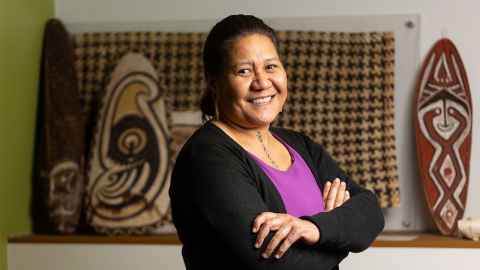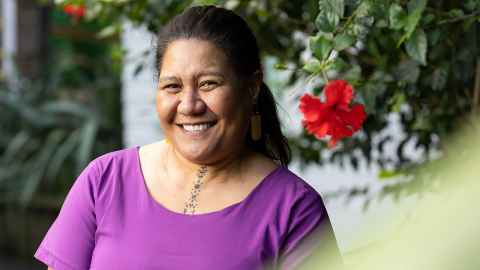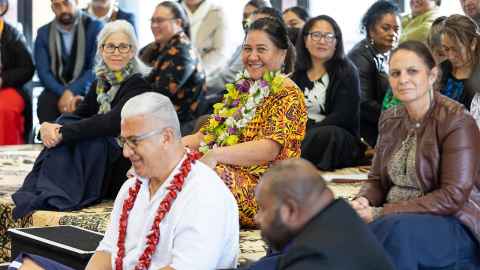Jemaima Tiatia: ‘This role is a celebration of life for me’
1 July 2022
The University of Auckland's new Pro Vice-Chancellor Pacific, Jemaima Tiatia, says she will be an effective leader by bringing her whole authentic self to the table.

From a young age, Associate Professor Jemaima Tiatia recalls either being put into leadership roles or falling into them by default.
“I am the eldest in my immediate family and you end up being a leader because as the firstborn you are born into it,” Jemaima says. “But also in school and in sports I’d always end up being placed in those roles. I think it was always in me; I’d just never thought about leadership that way.
“I was a little bit of a mischief-maker during my school days and I think to be a strong leader you do need to be comfortable with going against the grain, so it does come naturally to me, leadership with a little bit of mischief.”
Now she’s the new Ihonuku Te-Moana-Nui-a-Kiwa, Pro Vice-Chancellor Pacific, and she’s not so sure about the mischief side. There’s work to do.
Jemaima is the first Pacific woman to be a Pro Vice-Chancellor at Waipapa Taumata Rau and her leadership extends to communities, sports teams, research teams and university departments. She takes over from Professor Damon Salesa, now Vice-Chancellor of AUT.
Jemaima is the eldest child in her immediate ‘aiga and eldest grandchild on her mother’s side, with gafa (genealogy) belonging to the Sāmoan villages of Tāga, Sālelologa, Vaimoso and Si’umu. Her gafa connects her to the leader of the Mau movement and she comes from a prominent Sāmoan ‘aiga.
She was born in Tokoroa, went to Avondale College and lives in West Auckland. Her mum and nanny, who play pivotal roles in her life, also live in the area. They are both leaders in their own right, in their extended families and within the church.
Jemaima describes her own leadership style as ‘fearless and respectful’, a testament to her ‘aiga and their love. “My nanny and parents have all been both fearless and respectful. I like to think I am a reflection of their love as examples of strength and courage and trying to do what’s right.”
To be a strong leader you do need to be comfortable with going against the grain. That does come naturally to me; leadership with a little bit of mischief.
Jemaima is openly gay, and says her role in the Pasifika Rainbow community has strengthened her leadership skills and empathy.
“As much as I am Sāmoan and a Pacific woman, I am also gay. I am also someone’s partner, granddaughter, daughter, niece, sister, cousin, lecturer, aunty and colleague. While I may not be considered to be ‘flying the Rainbow flag’ as high as many would like, it’s a huge part of who I am.”
She says as a young Pacific person, she hadn’t understood what she was feeling with regards to her sexuality. “I didn’t have people around me at the time who could help me navigate my way through that, so I would censor myself, or at least part of myself, to fit in. To fit into my family and to fit into the communities I was a part of and serving. But censoring myself wasn’t helping me, nor was it helping those around me.”
She came to the realisation that she had set so many boundaries in place that they were stopping her from being her authentic self.
“When you’re confined like that, the pot eventually begins to bubble then boil. Where I found myself too confined or censored there would be some other part of my life that would boil over.
“It’s painful not being able to feel, act, think and function wholly, to truly be who you are. You learn that if not addressed, it can turn into unresolved trauma in your later years.”
She says the attitudes, behaviours and words of others also began to affect her well-being. “Being a ‘good Pacific girl’, I internalised that because I didn’t want to ‘hurt’ others. You harbour the pain because those are the people you love and care for. You don’t want them to feel disappointed or angry or sad, because those are your people.”
She says all the internalising took her to breaking point.
“I was starting to feel unworthy and it crushed me. Imagine trying to effect change for Pacific peoples while feeling completely unworthy; it absolutely took its toll.”
She says she was torn between trying to be a leader and concealing a part of herself in many situations to appease people.
“I mean, you wouldn’t walk into a club with one shoe on, would you? It doesn’t make sense.
“There came a point in my life where I realised I have to take care of my own mental health and well-being and people will either love me unconditionally or will choose not to be in my life, or work with me, or sit in my lectures. That is their choice to make. How people respond to my sexuality is not a ‘me problem’. I can’t be an effective leader if I am not bringing my whole being to the table.
While I may not be ‘f lying the Rainbow f lag’ as high as many would like, it’s a huge part of who I am.

“Pacific peoples are born to be leaders and shine, however, at times, there is always a ‘but’.
My ‘but’ was my sexuality and removing the ‘but’ has been life changing. I’m more fearless and really trust who I am, who my ancestors are and who my descendants will be.”
Jemaima is a big-picture thinker who knows what we do today will have an effect 20, 50, 100 years from now. It’s an insight that has informed her research, including the impact of climate change on the mental well-being of Pacific peoples.
At the University, her academic career began with a BA, majoring in education and then an MA honours. Her masters thesis was published as a book, Caught between Cultures (1998), a controversial insight into the tension between the traditional role of the church and its impact on young Pacific people’s mental, emotional and spiritual well-being. The book discussed uncomfortable and ongoing truths within Pacific communities and wider systemic inequities.
Her thesis had made her want to explore the subject further, but there wasn’t a suicide expert in Arts at the time.
“I found one in the Faculty of Medical and Health Sciences (FMHS), so I had to make the transition from Arts to FMHS, and that meant undertaking a Diploma in Public Health.
“My PhD in Community Health was funded by the Health Research Council of New Zealand and focused on suicide prevention among youth.”
It might not have been this way if she hadn’t been strong. “I was in a top-stream class at school and I clearly remember our seventh-form [Year 13]dean handing out tertiary information to students.
“He looked at me and walked straight past me. He never saw me as a possibility.”
She says from that moment she knew what she needed to do to ensure that sort of behaviour would never happen to her again. Now she is a leading Pacific expert on Pacific peoples’ mental health and well-being and suicide prevention, and a board member on the inaugural Mental Health and Well-being Commission.

I know I can make a difference and that my ancestors opened this door and probably pushed me in. We are only here for a short time; every second counts.
Before she took up the Pro VC Pacific role, she was teaching six courses including a postgraduate course on Intervention, Prevention and Promotion of Pacific Well-being. She has had to drop the teaching but will continue with research.
The Pro Vice-Chancellor role is often reserved for those who have reached the ‘pinnacle’ of academia: professorship. Jemaima is still working towards that so as well as being Pro Vice-Chancellor Pacific, she must continue to lead her research project and teams.
“I am grateful the University has let me take up this role with some allowance to still work on my Health Research Council-funded project (climate change and mental well-being in the Pacific). I have an excellent research team and we truly are smashing out the work.
“We are in the last phases of this study, which is a global first, and I am really happy with how it is coming together. I will miss conducting research and teaching but such is life, lots to compromise.
“You get pulled in so many directions in a role like mine and it’s easy to miss things, but I am getting better at balancing life and work. Prioritising things for the ones I love is especially important to me.”
What is not a compromise to Jemaima is her belief in Pacific peoples’ responsibility to tangata whenua.
“We have a duty and responsibility first and foremost to our Māori whanaunga. To tautoko (support) them in their journey to regain tino rangatiratanga as they see and understand it. Until we see Māori being given what they rightfully deserve, Pacific peoples will not be able to see our true potential as tangata Tiriti (people of the Treaty) here in Aotearoa.”
Jemaima says Māori and Pacific peoples have a special relationship that’s part of the sacred vā – the invisible space that connects people, entities and all things. She will be working closely with the Office of the Pro Vice-Chancellor Māori to ensure a lifelong continuance of that vā.
“This role is a celebration of life for me. After traversing all the rough patches, the breaking points and the bubbling over, the fact that I am here at this point in time, is a celebration. There were many times I wanted to give up, but it was the young people around me that kept me going.
“Similarly in this role, I know there will be tough times, but working to serve our students and our staff is what keeps me going.
“I know I can make a difference and that my ancestors opened this door and probably pushed me in. We are only here for a short time; every second counts. There is always someone watching and it’s important that I am here celebrating all of it because we are all worthy of this success.”
Story by Emmaline Pickering-Martin
The story first appeared in the July 2022 issue of UniNews.